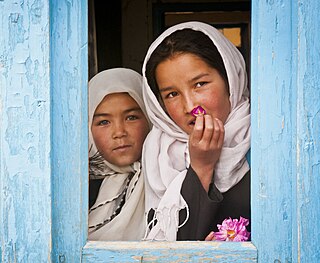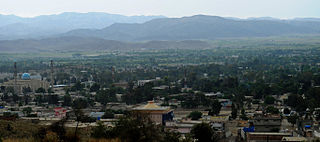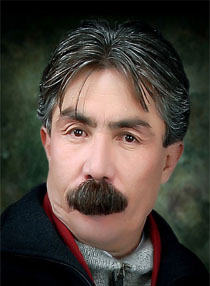Related Research Articles

The Hazaras are an ethnic group and a principal component of Afghanistan’s population. They are one of the largest ethnic groups in Afghanistan, primarily residing in the Hazaristan (Hazarajat) region in central Afghanistan. Hazaras also form significant minority communities in Pakistan, mainly in Quetta, and in Iran, primarily in Mashhad. They speak the Dari and Hazaragi dialects of Persian. Dari, also known as Dari Persian, is one of the two official languages of Afghanistan.

Saddam is an Arabic title that means "one who confronts". Other meanings include: "one who frequently causes collisions", "powerful collider", and "powerful confronter." The name has risen in popularity in some Sunni populations after the Iraq War and Saddam Hussein's execution.

Khōst is the capital of Khost Province in Afghanistan. It is the largest city in the southeastern part of the country, and also the largest in the region of Loya Paktia. To the south and east of Khost lie Waziristan and Kurram in Pakistan. Khost is the home of Shaikh Zayed University. The Khost Airport is located in the eastern area of the city.

Altaf Hussain is a British Pakistani politician who is known as the founder of the Muttahida Qaumi Movement. He holds United Kingdom citizenship and has been living in exile in the UK since the start of Operation Clean-up. Since 2015, he has been a fugitive from the Anti Terrorism Court of Pakistan on the charges of murder, targeted killing, treason, inciting violence and hate speech. He went on trial in the UK in January 2022 for promoting terrorism and unrest through hate speech in Pakistan, and was acquitted the next month. He had fled the country in 1992 after a crackdown against his party was launched.

Qazi Hussain Ahmad was an Islamic scholar, democracy activist, and former Emir of Jamaat-e-Islami, the socially conservative Islamist political party in Pakistan.
Mangal is a given name and a surname. Notable people with the name include:
Taj Mohammad Wardak is an Afghan politician. An ethnic Pashtun, he spent some of the period of the Taliban's administration in the United States of America, and became an American citizen.
Syed Arif Hussain Al Hussaini was an Twelver Shīʿā Muslim scholar, Islamist ideologue, Islamic Jurist, and Islamic Revolutionist Political leader of Shia Muslims in Pakistan. He is also known as Khomanei-e-Pakistan for his activities which earned him the reputation of being one of the most prominent advocates for the Shia population of Pakistan and Islamic revival of Ja'fari school of Islamic jurisprudence in the country. He viewed the ideas of secularism, liberalism and communism as evil, which he understood to be the influence of Western and Soviet imperialism. He was assassinated in 1988 at aged 41.

The Mangal are a tribe of the Pashtun people residing in eastern Paktia and adjacent Khost provinces of Afghanistan, and in the town of Tari Mangal, district Kurram, Pirdil Khel, Fatima Khel and Surrani of Bannu Pakistan. Their land constitutes the northeastern part of the Loya Paktia region. The Mangals descend from Karlani Pashtun lineage.
Mangal Bagh, also known as Mangal Bagh Afridi, was the leader of Lashkar-e-Islam, a militant group operating in Pakistan and Afghanistan. He was killed in a roadside bomb attack in Nangarhar, Afghanistan on 28 January 2021.

Mohammad Gulab Mangal is an Afghan politician. Since October 2016, he has been serving as the senior adviser minister of borders and tribal affairs for the president of the Islamic Republic of Afghanistan. He is also actively involved in the tribal conflict resolutions. On 23 October 2016, he was appointed as the senior adviser for the minister of borders, tribal affairs, and provincial governor of Nangarhar province until he resigned in April 2018. From 22 April 2015 to 23 October 2016, based on the presidential decree, he was appointed as the acting minister of Ministry of Borders and Tribal Affairs. In 2002, he was elected as the Representative of Paktia Province for Emergency Loya Jirga. From 2002 to 2004, he was the Head of Constitution office for the south east region(Paktia, Paktika, Khost and Ghazni provinces and also Head of Constitution Loya Jirga election office for the South East Region. From 2004 to 2006, he served as Governor of Paktika province. From 2006 to 2008, he served as the Governor of Laghman province. From March 2008 to September 2012, he served as provincial governor of Helmand province.

Hussain Ali Yousafi was an ethnic Hazara politician in Balochistan, Pakistan. Yousafi was chairman of the Hazara Democratic Party (HDP) and a member of the Quetta city council. He was assassinated by unknown militants in 2009.

Nawroz Mangal is a former cricketer from Afghanistan. Mangal is a former captain of the Afghanistan national cricket team who is known for leading Afghanistan to the prestigious ODI status. In January 2017, he retired from international cricket and became the national chief selector for Afghanistan.
David Stephenson Rohde, a journalist for The New York Times, and two associates were kidnapped by members of the Taliban in November 2008. Rohde was in Afghanistan doing research for a book. After being held captive for eight months, in June 2009, Rohde and one of his associates escaped and made their way to safety.

The Hussain Shahi dynasty was a family which ruled the late medieval Sunni Muslim Sultanate of Bengal from 1494 to 1538.
The Afghanistan national cricket team played a single One Day International (ODI) cricket match against the Pakistan national cricket team on 10 February 2012. The match took place at a time when Pakistan were due to play England in a follow-up ODI series in the UAE after defeating them 3–0 in a Test series.
The 2012 Kapisa airstrike refers to a NATO air raid in which seven children and one adult were killed in a village in Nijrab District of Kapisa Province, Afghanistan. The strike took place on 8 February 2012.

The Kheshgi or Khaishgi is a prominent Sarbani Pashtun tribe and Imperial dynasty in South Asia, mainly in India and Pakistan.
Zahid Hussain is a Pakistani journalist, writer and television analyst.
References
- 1 2 Syed Saleem Shahzad (2004-04-21). "Assault on Afghanistan's political soul". Asia Times. Archived from the original on 2008-05-16. Retrieved 2009-02-10.
{{cite news}}: CS1 maint: unfit URL (link)